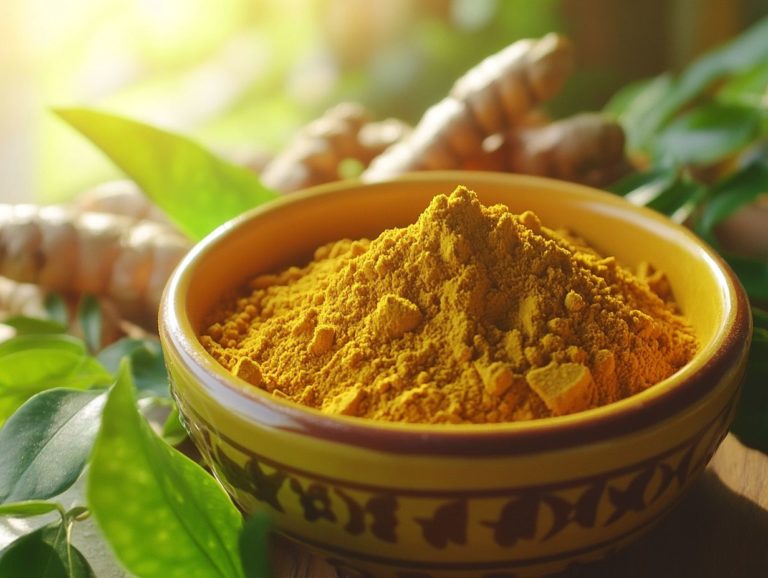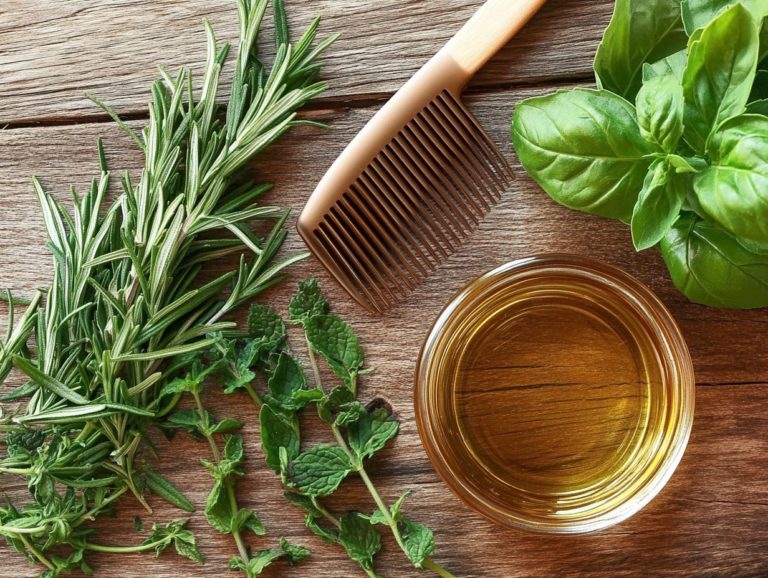Herbal Remedies for Headaches: Nature’s Pain Relief
Headaches can certainly disrupt your life. Gaining insight into their causes and types is the first step toward relief.
This article delves into common headache triggers and presents effective herbal remedies that harness nature’s healing powers. You ll discover how to prepare and use these remedies safely, along with potential side effects to be aware of.
You will also find tips to integrate these natural solutions into your daily routine, enhancing your ability to manage headaches more effectively.
Contents
Key Takeaways:

Herbal remedies can provide effective pain relief for headaches without the side effects of medication.
Understanding the types and triggers of headaches can help in choosing the right herbal remedy.
Proper preparation and dosage are key when using herbal remedies for headaches.
It’s important to consult with a healthcare professional before incorporating them into your routine.
Understanding Headaches and Their Causes
Understanding headaches and their causes is crucial for managing pain. They can stem from various health conditions like ongoing pain, tension, or migraines.
Headaches can present a spectrum of pain symptoms that affect your quality of life.
By pinpointing underlying causes whether muscle tension, inflammation, or related factors health professionals can suggest suitable therapies or pain relief options tailored to your needs.
Types of Headaches and Common Triggers
There are various types of headaches: tension headaches, migraines, and cluster headaches. Each has its own symptoms and triggers.
Tension headaches, the most common type, often result from stress, poor posture, or excessive screen time.
On the other hand, migraines can be triggered by dietary choices like caffeine, chocolate, or certain cheeses.
Cluster headaches, although rarer, may be triggered by sleep pattern changes or alcohol consumption, causing intense discomfort in cyclical episodes.
Recognizing these triggers is essential for finding effective relief methods. This might involve lifestyle adjustments, relaxation techniques, or dietary supplements aimed at easing symptoms.
By making informed choices, you can significantly reduce both the frequency and intensity of your headaches.
Herbal Remedies for Headaches
Discover the exciting world of herbal remedies! They offer a fantastic, natural way to relieve headache pain, including various herbs for natural pain relief.
By harnessing the therapeutic properties of ingredients like lavender oil, ginger root, and peppermint oil, you can effectively soothe discomfort and restore balance.
Effective Herbal Options for Pain Relief

Some of the most effective herbal options for pain relief include lavender, peppermint, turmeric, willow bark, feverfew, and clove. Each boasts unique anti-inflammatory effects.
- Lavender is often praised for its calming properties. Using it in essential oil form can promote relaxation and help reduce tension headaches.
- Peppermint s menthol content provides a delightful cooling effect that may ease pain when applied topically.
- Turmeric, with its active compound curcumin, offers potent anti-inflammatory qualities beneficial for chronic headache sufferers.
- Willow bark, a traditional remedy, works similarly to aspirin, delivering effective pain relief. Feverfew has been linked to a reduction in migraine frequency.
- Lastly, clove is known for its analgesic properties, particularly effective against sharp, acute headache discomfort.
How to Use Herbal Remedies for Headaches
To effectively utilize herbal remedies for headaches, it’s essential to understand the proper methods of preparation and dosage. This includes knowing how to apply topical treatments and using essential oils, ensuring they are appropriately diluted with a suitable carrier oil.
Mastering these techniques will enhance your experience and efficacy in managing headaches naturally.
Try out these herbal remedies today and consult your healthcare provider for personalized advice!
Methods of Preparation and Dosage
For effective headache relief, it is essential to understand the preparation methods and appropriate dosages for herbal extracts and essential oils. Different preparation techniques can boost their effectiveness.
Create herbal extracts through infusions, where dried herbs are steeped in hot water, resulting in a concentrated solution packed with beneficial compounds. Teas also provide a soothing way to harness the properties of these plants, offering both hydration and relief.
Topical applications, like essential oil blends, can be used on pressure points for targeted support. Pay attention to dosing, as using incorrect amounts may lead to adverse reactions.
Always consider safety factors, including possible allergies and how they might interact with medications, before incorporating these remedies into your routine.
Potential Side Effects and Interactions
While herbal remedies can offer effective relief for headaches, it is essential to remain mindful of potential side effects and interactions with conventional pain medications. Consulting with health professionals is highly advisable to ensure your safety and well-being.
Precautions and Warnings

Taking precautions when using herbal medicine is essential, particularly if you have existing health conditions or are currently on other medications. Professional guidance can significantly help mitigate any potential risks.
Certain herbal remedies may interact negatively with prescription drugs, possibly reducing their effectiveness or intensifying side effects. For example, St. John s Wort, a plant used for mood enhancement, can interfere with antidepressant medications, while ginkgo biloba may present risks for those on blood thinners.
If you have allergies, are pregnant, or have chronic conditions like diabetes or heart disease, act now! Professional guidance is essential, not only for determining the correct dosage but also to ensure safe combinations and suitable choices that align with your unique health profile.
Incorporating Herbal Remedies into Your Routine
Start using herbal remedies today for a powerful way to manage headaches naturally.
By integrating techniques such as mindfulness meditation and relaxation strategies, you can effectively complement the benefits of these remedies, fostering a holistic sense of well-being.
Tips for Managing Headaches Naturally
To manage headaches naturally, consider embracing wellness strategies that encompass dietary changes, effective stress management techniques, and the use of natural pain relief options like herbal remedies.
These methods can cultivate a holistic approach to reducing both the frequency and intensity of headaches. By incorporating a balanced diet rich in omega-3 fatty acids, magnesium, and essential vitamins, you lay the groundwork for overall health.
Regular practices such as yoga, meditation, and deep breathing exercises can alleviate tension, a common headache trigger. Opting for herbal remedies like feverfew or peppermint may offer soothing benefits, while maintaining proper hydration through consistent water intake supports optimal bodily function.
Such lifestyle adjustments and complementary therapies enable you to find relief from headaches without solely depending on pharmaceutical solutions.
Frequently Asked Questions
What are herbal remedies for headaches?

Herbal remedies for headaches are natural treatments that use plants and herbs to alleviate pain and discomfort associated with headaches. These remedies have been used for centuries in traditional medicine and are known for their effectiveness and minimal side effects.
What are the benefits of using herbal remedies for headaches?
Herbal remedies for headaches have several benefits, including: providing natural pain relief, reducing inflammation, promoting relaxation, and improving overall health and well-being. They are also a safe alternative to over-the-counter pain medications, which can have harmful side effects.
Which herbs are commonly used for headaches?
Common herbs for headaches include feverfew, butterbur, peppermint, ginger, and willow bark. These herbs are known for their pain-relieving and anti-inflammatory properties.
How are herbal remedies for headaches used?
You can use herbal remedies in several ways. Drink herbal teas, use essential oils in aromatherapy, apply herbal compresses, or take herbal supplements. Choose the method that works best for you.
Are herbal remedies for headaches safe to use?
Herbal remedies for headaches are generally safe. Still, it s wise to consult a healthcare professional before trying any new remedies, especially if you re pregnant, breastfeeding, or on medication.
Can herbal remedies for headaches be used for preventive care?
Absolutely! Regular use of these remedies can significantly reduce the frequency and severity of headaches. They also complement other preventive measures like stress management and a healthy diet.






